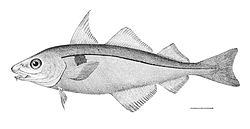haddock
Appearance
English
[edit]
Etymology
[edit]From Middle English haddok. Compare Anglo-Norman hadoc from Old French hadot, probably from an English source.[1][2] Further origin uncertain, but hadot could have evolved from (h)adoux, (h)adoz, from adoub, from adouber, adober (“to prepare”), cognate with Italian addobbare (“to souse fish or meat”).[3]
The spelling is usually regarded as a diminutive in -ok (see -ock).
Pronunciation
[edit]- IPA(key): /ˈhædək/
Audio (Southern England): (file) - Rhymes: -ædək
Noun
[edit]haddock (plural haddock or haddocks)
- A marine fish, Melanogrammus aeglefinus, of the North Atlantic, important as a food fish.
Derived terms
[edit]Related terms
[edit]Descendants
[edit]Translations
[edit]marine fish
|
References
[edit]- ^ https://www.etymonline.com/word/haddock
- ^ https://www.oed.com/dictionary/haddock_n?tab=etymology#2167075
- ^ Weekley, Ernest (2013): An Etymological Dictionary of Modern English
Portuguese
[edit]Etymology
[edit]Unadapted borrowing from English haddock.
Noun
[edit]haddock m (plural haddocks)
- Alternative form of hadoque
Categories:
- English terms inherited from Middle English
- English terms derived from Middle English
- English terms derived from Anglo-Norman
- English terms derived from Old French
- English 2-syllable words
- English terms with IPA pronunciation
- English terms with audio pronunciation
- Rhymes:English/ædək
- Rhymes:English/ædək/2 syllables
- English lemmas
- English nouns
- English countable nouns
- English nouns with irregular plurals
- English indeclinable nouns
- English terms suffixed with -ock
- en:Gadiforms
- Portuguese terms borrowed from English
- Portuguese unadapted borrowings from English
- Portuguese terms derived from English
- Portuguese lemmas
- Portuguese nouns
- Portuguese countable nouns
- Portuguese terms spelled with K
- Portuguese masculine nouns

